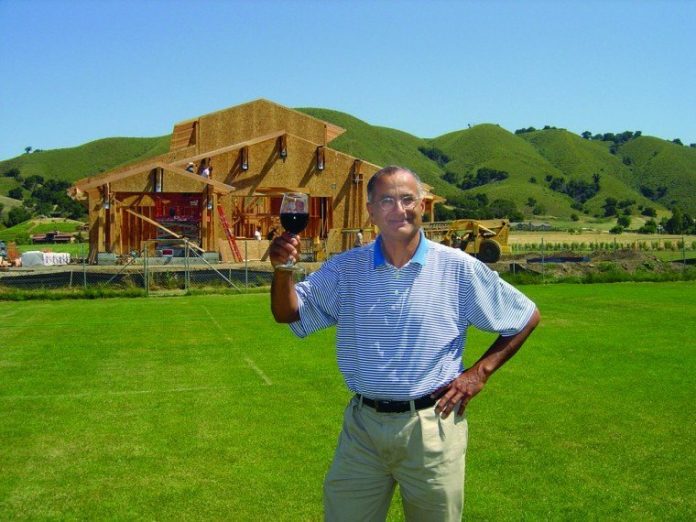Area wineries have been told to put a cork in the noise when it comes to entertaining guests, unless proprietors pony up close to $5,000 for a one-time special outdoor amplified sound permit and associated noise consultancy fees.
Dhruv Khanna, owner of Kirigin Cellars on Watsonville Road, called the 2013 additions to the County’s noise ordinance “obnoxious” because “it basically killed the sounds of music in wineries for the whole duration of the 2013 calendar year.”
However, District 1 Supervisor Mike Wasserman said the only ones complaining about the amplified sound permit – which was “received with overwhelming approval and acceptance” – are those who were operating illegally in the past. Without singling out any wineries, Wasserman said some were hosting large-scale events without proper access for emergency vehicles as well as the proper amount of restrooms and parking spots.
“All fees that were changed either went down or were eliminated,” Wasserman said. “It’s very important to me that the truth gets out there.”
The truth, Wasserman says, is that the previous $14,000 cost for hosting outdoor events in unincorporated areas with amplified sound, such as a band, were reduced to a one-time, $1,000 permit fee, while events of any size with no amplified sound were eliminated altogether.
Wasserman made clear the amplified sound permit fee was “not per event; not per year” but “it runs with the land.”
So far, however, there have been no takers and some local vintners are expressing frustration with changes to the county ordinance that took effect in January 2013, following a unanimous vote by the Board of Supervisors in December 2012.
Sheldon Haynie, co-owner of Lightheart Cellars in San Martin and outgoing president of the Wineries of Santa Clara Valley Marketing Association, says the new stipulations have forced winery owners to limit their entertainment to acoustic performances with no amplified sounds. Such is the case with the popular music night series at Sarah’s Vineyard on Hecker Pass, which starts back up in May and will not require an amplified sound permit.
“It precludes us from having smaller events and providing entertainment (with amplified sound),” explained Haynie, noting that several wineries are switching to acoustic-only formats in order to circumnavigate the new amplified sound permit fee.
County Principal Planner Robert Eastwood, who closely worked on the revisions that were meant to promote, rather than hinder, the agri-tourism business, confirmed Wednesday that not a single winery has applied. He said County staff estimated the cost for the lifetime permit and associated consultant fees at closer to $3,000 rather than the higher estimates.
“A one-time investment of $3,000 on a permit (plus associated fees) that lasts forever, financially, seems like a small investment,” said Eastwood, who believes that any winery owners, currently up in arms about the one-time fee, will settle down. “Sometimes you just have to let these things play out.”
One reason the County revised the use permits portion of the noise ordinance was in response to disgruntled neighbors of a few South County wineries that were regularly pumping tunes to the late night hours, especially on Friday and Saturday evenings.
But Haynie points out those incidents were largely isolated and related to a small handful of wineries, and steps taken by the County are causing all wineries to suffer the consequences for the actions of a few.
“All wineries have an interest in being good neighbors. It’s bad business to be otherwise,” said Haynie.
Entertaining guests without disturbing neighbors seeking solace in the country is a “delicate balance,” he added. “The intent of the code and the implementation are not lined up.”
Eastwood disagrees. He said the changes help with “fair business practices,” where one winery, regardless of size, should not be allowed to get away without paying a fee while others do.
At the same time, the County did not want smaller venues to have to pay the same price. Larger scale wineries, such as Guglielmo Winery on East Main Avenue in Morgan Hill; Fortino Winery on Hecker Pass Highway in Gilroy; and Clos LaChance Winery on Hummingbird Lane in San Martin – all hold multiple events every year – previously purchased permits at the higher cost.
Executive Director Jennifer Sheer of the Santa Clara County Farm Bureau said the County’s existing noise ordinance “was sufficient” and that “wineries shouldn’t have their own amplified sound permit.”
“We never felt there was a need for something specific to wineries, so we did not support the updates to the ordinance,” she explained. Sheer said although the ordinance isn’t written solely for wineries and extends to all county commercial, industrial, and institutional facilities (i.e.: wineries, schools, churches, bars, restaurants), wineries have been the most impacted.
“I think it takes some of the fun out of visiting a winery,” Sheer continued. “A lot of wineries would get a local band to play for Passport Weekend (a popular bi-annual industry event) and now they are not able to do that because it’s a hindrance to get the permit.”
Now, vintners including Khanna want the County to add some special exemptions to the noise ordinance requiring the amplified sound permit for industry-wide events such as the bi-annual Passport Weekend, which takes place on weekends in March and October. Each winery has something special to offer during the event, which in spring sold 1,000 tickets and amounted to one of the region’s largest wine events.
Khanna has also proposed to the County Board of Supervisors that smaller venues get a couple of free passes during the calendar year to allow for outside music, only up until 6 p.m.
“It should be a no-brainer,” said Khanna of his suggested revisions. “We’re trying to make plans for 2014 and it would be nice to get some exemptions passed in December and January.”














